(Crack IAS in 60 days) How to Cover the Syllabus for UPSC (Pre) G.S.
(Crack IAS in 60 days) How to Cover the Syllabus for Civil Services (Pre) G.S.
Civil Services Prelims Examination is just few days away. All IAS aspirants should dedicate themselves fully for the upcoming challenge. However, very often it happens that, the close proximity of the exam raises the stress level among the candidates, and they are not able to focus on their studies.
The main problem that the candidates face is to cover the wide syllabus for the civil services exam. No doubt that the syllabus of the IAS exam is too wide. But, it can be effectively handled by making a highly selective study of the syllabus, putting maximum effort on the relevant portions. But, this task might take a substantial amount of time of the candidates. Also, not everyone is able to narrow down the syllabus, to make a selective study plan.
Thus, UPSCPORTAL presents a plan to cover the GS Paper I syllabus in 60 days.
As per our analysis of the 2013 Prelims examination, the weightage from each section was as follows:
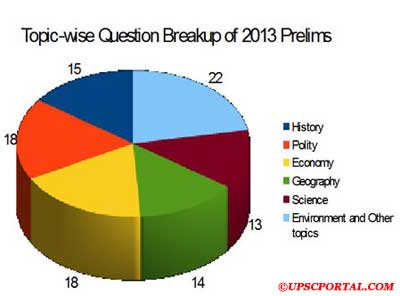
First of all, You should not raise your stress level by thinking about the limited time available. Instead of thinking about the vast syllabus and various ill-thoughts that we get in such times, you should think about how you will make the most of the available time.
It is not impossible to cover the syllabus in this amount of time. If you plan well, and prepare a rational study schedule, you will be able to cover all the topics comfortably and with adequate time left for revision.
As for the various parts of the GS paper, here is an analysis:
History
The UPSC notification on Civil Services Examination mentions the history portion for Prelims as- 'History of India and Indian National Movement'. Though the scope is topic is not very clear from this, but from the analysis of the previous papers, it can be derived that the History portion includes all- the Ancient, Medieval and Modern History.
A candidate should handle the different parts of history. However, many-a-times, one finds it difficult to cover all the aspects of a subject. Therefore, it is advisable to make a simple reading for the parts that one finds very difficult. However, it is also important that you do make a few attempts at reading all the portions, as leaving a subject, as important as history, could prove risky.
Do not try to go for a research in particular topics. Try to finish each topic in a day or two. For instance, you should devote not more than 3 days for ancient history, 2 for medieval, and 4 for modern history and indian national movement.
Highlight the points that are creating a trouble, and skip such sections, to be done later, if there is time left.
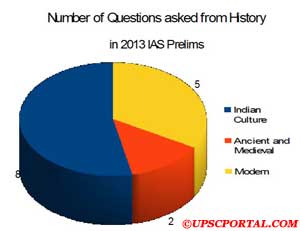
Note: if you are choosing to skip a section of history, make sure that the other parts are reinforced so as to Compensate for the loss made at the other section.
Geography
The recent trends in the questions from geography shows that the UPSC has been moving away from asking direct questions on theories and feature. Rather, questions have been asked, more frequently, from sections like- Environmental ecology, biodiversity and climate. Since the relevance of these topics is more apt than the more traditional subjects, an aspirant should focus on such concept. Thus, instead of going deep into the traditional topographical knowledge of different areas, or mugging up the census reports, it is more rational to understand and know about the applicability of different concepts, from a contemporary perspective.
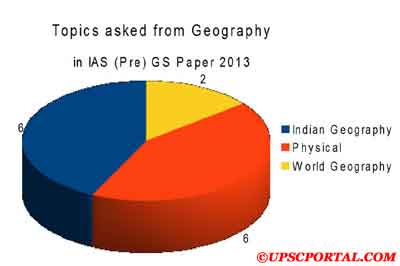
Given the limited time, you might not be able to memorize all the facts and figures that are given in the books, thus, it would be better to read the previous years questions papers and then focus on the important areas first and then moving towards the less important areas.
Indian Polity and Governance
The syllabus might appear to be too wide to study, but a rational approach can help you to cover each part adequately. You might choose to ignore going deep into the study of constitution, and instead choose to study only the important and relevant parts. For instance, while the structural and working provisions might be important for the preparations, the technical aspects of the constitution might be ignored. This would save your time, which can be dedicated for other more important topics.
Secondly, as mentioned in our earlier articles, it is useless to devote a substantial amount of your time in reading about the dynamics of the party politics in the country. Instead, read about the policy decisions and major agreements by the government. The recent trend of the UPSC has been to avoid asking the direct theoretical question. Instead, there are more analytical questions, which require your comprehensive understanding of different events and provisions.
In the 2013 GS (Pre) exam, out of a total of 18 questions from Polity, about 12 were from the constitutional provisions, relating to legislature, executive and amendments. Remaining 6 questions were asked from non-constitutional bodies and issues related to certain rights. Therefore, You should study the constitution carefully, as a good number of questions are asked from it.
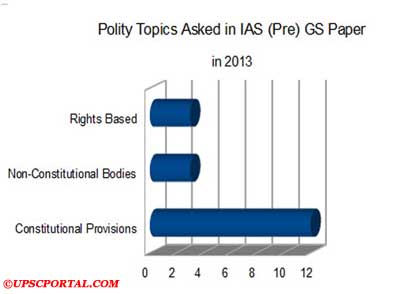
Economic and Social Development
some of the aspirants find it difficult to study about the complex economic concepts. Therefore, a rational approach is to avoid getting involved excessively in the conceptual part of economics. Instead, a candidate should focus on the application and impact of the economic decisions on the society, particularly in the context of India. For instance, instead of reading about the theory of Human Development Index, one must read about the recent trends in the sphere.
The role of functions of the World Bank, IMF, WTO, Asian Development Bank, UNO etc, should be given a special focus, as these topics have gained prominence in the recent years.
In IAS Prelims of 2013, out of the 18 questions asked from Economy and Social Development, 7 came from the topic- Banking and allied topics; 5 from GDP and related concepts; and 3 each from Inflation and Foreign Trade.
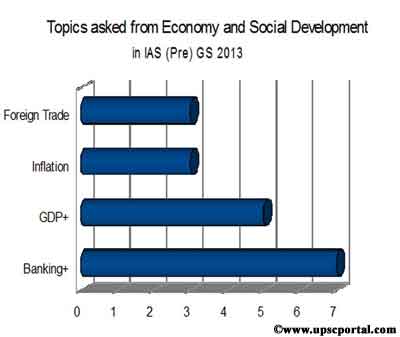
Environment, Bio-Diversity, Climate Change & General Science
In the recent past, questions have been asked on various international conventions on climate change and biodiversity. Since Indian government has been taking a keen interest in the climate issue, there are many developments in the field. Thus, a candidate must understand the various developmental aspects and the major initiatives.
It is important to make an intelligent study of these topics. Since there is a lot of information available on these topics, you must first analyze what is to be read.
In Chemistry, important minerals and their ores, are important. Questions are generally asked about the economically significant ores.
Similarly, Biology has some important segments from which atleast one question is asked every year. You will find one or two questions relating to the distribution of flora and fauna, in India or the world. Thus, you might read the respective topics carefully. However, if you really find it difficult to read and remember about the trivial details of some topics, you might choose to skip them, but only if you have made a better grip on other topics.
Another important segment of the science and technology relates to the developments in the field of IT, Space, Defense, Nuclear Power, Biotechnology etc. However, a candidate should focus on the application of these topics, instead of mugging up about the theory associated. It is in this context that aspirants from every background are placed on an equal footing.
If we look at the IAS (Pre.) GS 2013, there were 13 questions from the Science section. Interestingly, a majority of these 13 questions were asked from Biology section. Thus, the candidates should focus on Biology section more, while putting lesser effort for the traditional theories of physics and chemistry.
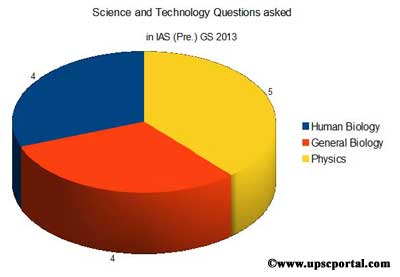
Current Affairs
There is a lot of hue and cry about the significance of the current affiars in the IAS (Pre) GS exam. However, it is important to note that the study of current affairs and general knowledge should be done judiciously, so as to save one’s time and effort.
The recent analysis of the IAS Prelims have suggested that- a lesser number of questions are being asked from the current affairs section, as compared to the previous years question papers. There has been a change in the approach of the UPSC.
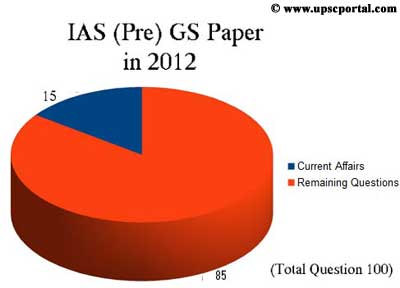
Now, the issues of current affairs are being asked in the context of the theoretical issues. Thus, it becomes important to know about the concept first. Many-a-times, one is able to answer a question on current affairs, even if one is not aware of the event itself. This is only due to your conceptual clarity, which helps you in logically deducing the answer.
However, quite recently, the UPSC has been asking questions based on the application of the theory and concepts. Thus, it has become important to know about the current affairs.
Thus, remember to study the current affairs, as it is very important from an exam point of view. However, you must link the study of current affairs with the basics. It is hard to mug up everything available in the dailies and internet, till the exam. Thus, linking the different topics to the things you study helps in remembering the concepts and current events both. Read how to study for current affairs.
UPSCPORTAL has come up with a 60-days short term course for the IAS (Pre.) examination. The course has been made, keeping in mind, all the intricacies and nature of the exam, and the time left. Our goal is to aid the candidates in their preparations for the upcoming exams. Given the short time, left for the exam, we have narrowed down the topics which are most crucial from the IAS exam point of view.
The 60-days programme will help you do a selective study, and help you fetch maximum possible marks, with the minimal effort required.
To save your effort and time, you might choose to read The GIST, which provides you with the important articles and events from the Hindu, Kurukshetra, Yojana, Science Reporter and PIB. You may also choose to read the Weekly Current Affairs to keep yourself up-to-date with the current affairs of India and the World. But, if you have sufficient time with you, it is best to read the original sources.
It is not difficult to cover the GS syllabus in 60 days. However, the key to success is faith in your efforts. Now is the right time that you should dedicate yourself completely for the civil services exam. UPSCPORTAL strive to help the candidates in their efforts.
Please feel free to contact us regarding your queries and concerns.
Click Here to Join 60-days IAS Pre Crash Course
All the Best Candidates
Team UPSCPORTAL


